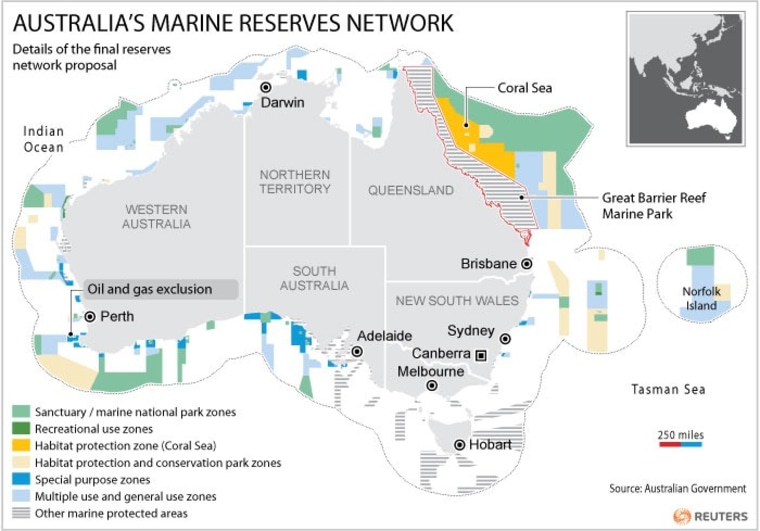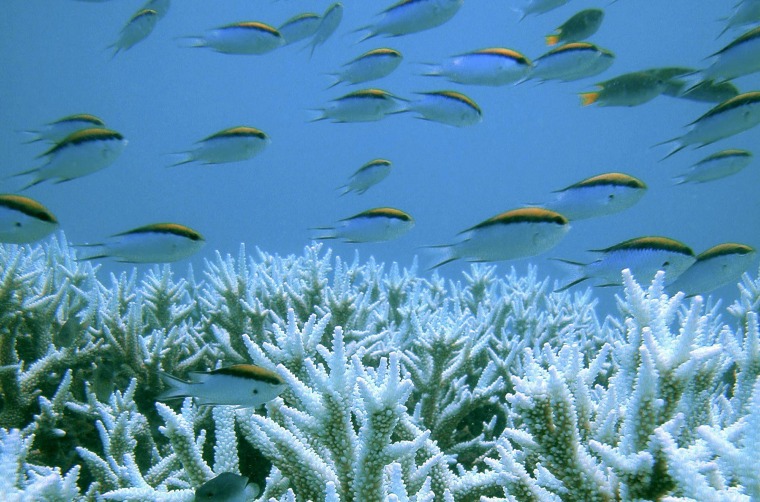Australia has created the world's largest network of marine reserves and will restrict fishing as well as oil and gas exploration in a major step to safeguard the environment and access to food.
With the expansion announced Thursday, Australia will protect 1.2 million square miles of ocean. The reserves will encompass a third of the island continent's territorial waters, which sustain more than 4,000 species of fish.
Australia is surrounded by the world's third-largest ocean territory, which provides important habitat to threatened species of whales, sharks and turtles as well as spectacular corals.
Previously only 310,000 square miles of Australian waters were protected. According to the Protect Planet Ocean website, only 1.1 million square miles of oceans worldwide were within marine protection areas before.
Environmental group WWF welcomed the expansion as a "major advance in marine conservation" that hopefully will inspire other countries at next week's United Nations' Rio+20 conference on sustainable development.
Environment Minister Tony Burke said the government expects to pay an estimated $100 million to compensate the fishing industry for new restrictions that will take effect late this year, with only a minor impact on most types of fishing.
While the public will be invited to lodge complaints before the sanctuaries are enshrined in law, the center-left government faces no hurdles in imposing the new restrictions under existing environmental laws.
But the conservative opposition has vowed to review the boundaries if it wins government at elections next year — an outcome that opinion polls agree is likely.
"I am instinctively against anything that damages the rights of recreational fishing ... and anything that will further damage the commercial fishing industry and tourism industry," opposition leader Tony Abbott said.
The number of marine reserves off the Australian coast will rise from 27 to 60.

Highly protected areas such as the Coral Sea off Australia's northeastern coast and the adjoining World Heritage-listed Great Barrier Reef also will be protected from oil and gas exploration. Both areas, which cover 500,000 square miles, have shallow reefs that support tropical ecosystems with sharks, coral, sponges and many fish species.
Burke said he wanted the reserves to set a benchmark for the world in environmental protection and food security — the access to and consistent availability of food. The plan aims to guarantee future fish stocks by preventing overfishing.
"We have an incredible opportunity to turn the tide on protection of the oceans and Australia can lead the world in marine protection," he said.
Don Henry, chief executive of the environmental group Australian Conservation Foundation, said the plan will make Australia a global leader in ocean protection.
But he warned that the remote northwest region where an offshore oil and gas industry is already established had been left vulnerable to the threats of further energy exploration.
Rachel Siewert, a senator for the environmentally focused Greens Party, which supports the Labor Party minority government, described the plan as a "cave-in to the oil and gas industry."
She said allowing exploratory drilling beside some of the most highly protected zones off northwest Australia leaves critical habitats for threatened species, including humpback whales, whale sharks, flatback turtles and dolphins, vulnerable to contamination from oil spills.
Judy Lynne, chief executive of the recreational anglers' group Sunfish Queensland, said the ban on commercial operations in the most environmentally sensitive areas would result in more foreign trawlers fishing illegally.
